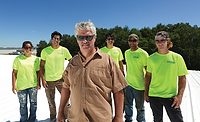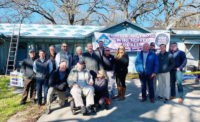3-D Roof Systems LLC
Rain or Shine, 3-D Roof Systems LLC Maintains a Family Legacy of Commitment, Exceptional Service to Customers in the Pacific Northwest

The 3-D Roof Systems crew installs the first phase of a 50,000 square foot project in Lynnwood, Wash., that features a vegetative roof. The job is scheduled for completion later this month. Photos by Ahmann’s Images.

To waterproof the roof on the Lynnwood project, 3-D Roof Systems used Polyglass’ premium three-ply APP roof system for heat-welded applications. The roof system consists of two layers of Polyflex base sheet and one layer of Polyflex G cap sheet in white.


There’s something to be said about working for your family business. Though one might assume that it’s the path of least resistance, in many cases, it’s anything but — especially in the roofing business. And, as most veteran roofing contractors will tell you, from beginning to end, roofing is hard, tedious, get-your-hands-dirty work.
As far as hard labor goes, working on roofs during hot summers, rainy springs and cold winters is only the beginning. Whether you’re working for your family business or not, roofing is an industry of milestones and climbing your way up (both literally and figuratively). Nevertheless, the payoff of earning your place in the family business is quite rewarding.
Much like third-generation roofing contractor Dustin Kathol, owner of 3-D Roof Systems LLC, whose journey through the world of roofing has been a gratifying experience. “It has always been great, but I definitely wouldn’t say it was easy,” he explained. “Nothing was handed to me. I had to start at the very bottom and work my way up in the rankings.”
The company as it stands today was founded in 2002 in Edmonds, Wash., though the Kathol family has been roofing in the Pacific Northwest since the early 1950’s. It’s home to 30 non-union employees, many of whom are long-term team members who’ve worked together for decades. The installation teams at 3-D Roof Systems are certified in all forms of roofing, and have completed projects from both the commercial realm (80 percent) as well as residential (20 percent).
Family Function
Dragged around to jobsites from a very young age, Kathol recalls following closely behind his father, Dale, whom he inherited the company from a little over a year ago.
“Our office has been the central hub of our family, friends and team since before my birth. Roofing has always been a large part of my life,” he said.
Not just roofing, but the company itself, which Kathol proudly admits is the only he’s ever worked for. He started his senior year of high school as a commercial installer, tearing off roofs and gaining hands-on experience. Following graduation from Western Washington University, Kathol returned home to work for the family business, and the rest is history.
He explained that having only worked for his family business has provided both advantages and disadvantages throughout his career. Forced creativity, as he calls it, has been a benefit in that he’s able to do things his own way, and in a more relaxed manor than his competitors. In turn, he admits that it’s a constant learning process, especially when it comes to systems and standardized practices. Staying engaged and active in industry associations, such as the Roofing Contractors Association of Washington — where he served as a board member for three years, has played a great role in perfecting operations and procedures.
Planning Ahead
The Pacific Northwest boasts a wide range of climates with one common denominator: rain. With the uncertainty of global weather patterns each year, roofing contractors in this region must be fully prepared for any weather that comes their way. And in the roofing world, rain is equally a nuisance as it is unpredictable. According to Seattle Weather Blog, Seattle (a major city within the company’s territory) received 5.38 inches of rainfall in the first three weeks of March; average rainfall for the entire month is 3.72 inches. “Weather plays a huge role in our production schedule since most of the work we do is tapered insulation systems, so they cannot get wet during installation,” said Kathol.
In an effort to avoid halts in production, the company uses forms of tenting, or forced air inflatable bubbles to eliminate rain issues. They also install temporary EPDM roof systems to double up as a vapor barrier.
The team also has several procedures in place for pre-job planning. Specific installation instructions are created for each project in order to keep foreman informed on the details. Kathol creates 3-D models of various projects to help his team visualize how each project will come together, and make sure they’re equipped with the proper skills. “I try and have a job set up beforehand so that there’s no unanswered questions. We try to find all the unforeseen issues in advance,” he said. “No two projects are ever the same in this industry. Most of our installers remain flexible and are cross-trained in all types of roof installations.”
They also work closely with customers to earn their trust as a reputable roofing company. The team strives to eliminate any gray area by communicating directly with customers, helping them understand their options, and what makes the most sense for their project. “We design systems to meet budgets, while meeting the needs of the customer. We don’t go for the short, hard sale. We put in the time,” Kathol said.
Looking ahead, Kathol said the company will continue refining processes and developing a plan to solidify cost budgets on projects. He explained that although it’s easy to get people on board with new procedures in the beginning, making sure they stay on board remains a challenge. But he’s learned a thing or two from several decades in the industry; “To keep it simple, always plan for rainy weather,” he said.
Looking for a reprint of this article?
From high-res PDFs to custom plaques, order your copy today!









